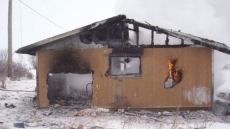HALIFAX — Marijuana remains the drug of choice for members of the Canadian army, based on the Force's latest blind drug testing report that also found cocaine is gaining popularity among some members.
The report, done between Jan. 1 and Dec. 31, 2013, found the overall drug consumption rate has been relatively stable since 2010 but suggested young, non-commissioned members were more prone to do drugs.
The findings, contained in a 42-page report obtained by The Canadian Press under the Access to Information Act, included testing for 11 controlled substances at 26 Armed Forces units across the country. There were 4,198 participants from most ranks and age groups.
The testing found that 279 urine specimens — or 6.6 per cent — tested positive for at least one drug, with pot detected in 5.3 per cent of all of the samples. That's up from the 4.2 per cent in 2012 and 4.8 per cent the year before that.
Positive test results for marijuana came from 19 units, with the bulk from 3 Royal Canadian Regiment and 2 Service Battalion in Petawawa, Ont.
The report says nine units had cocaine-positive samples, with the most again from members in 3 Royal Canadian Regiment in Petawawa. Results showed 44 samples overall had traces of cocaine, up from the 29 positive samples the previous year, making it one of the higher rates since the testing started in 2007.
While the numbers were considered low, members of the psychosocial health dynamics team who wrote the report said there was a higher likelihood that members tested positive for cocaine in 2013 than in 2009.
"There was a significant difference for the proportion of cocaine-positive samples, such that 2013 blind drug testing participants were significantly more likely to test positive for cocaine than those tested in 2009," the report states.
The results found that drug use is significantly more likely to occur among junior non-commissioned members aged 27 years or younger.
The document offers no reasons for the perceived increase, but cautions that the most recent samples were more likely than those in 2009, 2011 and 2012 to be rejected because of a flaw. It said eight units had samples that tested negative for drugs, but were found to be diluted.
The Canadian Forces has a zero-tolerance policy for illicit drugs and conducts testing to gather data to guide its Drug Control Program. No one from the Defence Department was available for an interview on the report, but a spokeswoman said in an email that "the results are not used for disciplinary purposes as no urine sample can be attributed to a specific member."
The findings might provide insight into where drug use is occurring, what types of drugs are being taken and what population is most involved.
"The units identified in the present analysis as having the highest proportion of positive tests may provide the army with locations to target drug intervention efforts," the report states.
"Because younger and low-ranking members had higher drug use rates, it might also be beneficial to focus those interventions on these populations."
Traces of morphine, methamphetamine, and the amphetamines MDMA and MDA were also found at low rates.
The anonymous samples were sent to an independent lab contracted by the military, with the results provided last March.
The units in the study were chosen by the Chief of Land Staff or by the unit's commanders or commanding officers, and did not include the Royal Canadian Navy or Royal Canadian Air Force.






